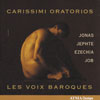Carissimi (4) Oratorios
Curious about Carissimi? Hear his ‘greatest hit’ plus three short oratorios
View record and artist detailsRecord and Artist Details
Composer or Director: Giacomo Carissimi
Genre:
Vocal
Label: ATMA
Magazine Review Date: 10/2010
Media Format: CD or Download
Media Runtime: 0
Mastering:
Stereo
Catalogue Number: ACD22622

Tracks:
| Composition | Artist Credit |
|---|---|
| Jonas, 'Histoire de Jonas' |
Giacomo Carissimi, Composer
Alexander Weimann, Organ Giacomo Carissimi, Composer Les Voix Baroques |
| Jephte, 'Historia di Jephte' |
Giacomo Carissimi, Composer
Alexander Weimann, Organ Giacomo Carissimi, Composer Les Voix Baroques |
| Ezechia |
Giacomo Carissimi, Composer
Alexander Weimann, Organ Giacomo Carissimi, Composer Les Voix Baroques |
| Job, 'Historia di Job' |
Giacomo Carissimi, Composer
Alexander Weimann, Organ Giacomo Carissimi, Composer Les Voix Baroques |
Author: David Vickers
Giacomo Carissimi (1605-74) spent almost his entire life near or in Rome and pioneered the genre of sacred music drama that later became known as “oratorio”. His most commonly performed masterpiece is Jephte (which adheres to the stark tragedy described in Judges 11, whereas Handel a century later provides a happy ending). It was composed sometime before 1650, when the Jesuit scholar Athanasius Kircher published a treatise quoting its final chorus of lamentation as an ideal example of how Carissimi “surpasses all others in moving the minds of listeners to whatever affection he wishes”. The unforced ensemble singing of Canadians Les Voix Baroques is didactic, in keeping with the work’s origin, but the music-making is also poetic and expressive when required. Unlike some more extrovertly dramatic approaches, Jephthah’s vow to make a sacrificial offering to God if he returns victorious from war is sung plainly by tenor Lawrence Wiliford, but Suzie LeBlanc steals the show as his innocent daughter; she moves seamlessly from the sparkling welcome song for her father to her vulnerable lament to the mountains. The gentle performance of the gorgeous final chorus, “Plorate filii Israel”, suggests that the six singers listen, watch and respond to each other with keenness and subtlety.
Admirers of Carissimi might have several excellent versions of Jephte in their collection but Les Voix Baroques present another three short oratorios that are recorded infrequently. Each is distinct in musical conception and confirms that Carissimi is no mere one-hit wonder. The tempest sent by God to punish Jonah for sailing away from his prophetic responsibilities is depicted vividly in an extraordinary chorus, and the penitence of the want-away prophet inside the whale’s belly is sung emotively by tenor Colin Balzer. Isaiah’s warnings to the righteous king Hezekiah are sung with solemn authority by countertenor Matthew White, who takes centre stage as the afflicted Job in conversation with the Devil and a reassuring Angel. Throughout proceedings Alexander Weimann directs judiciously from the keyboard. If you are curious about Carissimi, this is a good place to start investigations.
Discover the world's largest classical music catalogue with Presto Music.

Gramophone Digital Club
- Digital Edition
- Digital Archive
- Reviews Database
- Full website access
From £8.75 / month
Subscribe
Gramophone Full Club
- Print Edition
- Digital Edition
- Digital Archive
- Reviews Database
- Full website access
From £11.00 / month
Subscribe
If you are a library, university or other organisation that would be interested in an institutional subscription to Gramophone please click here for further information.




